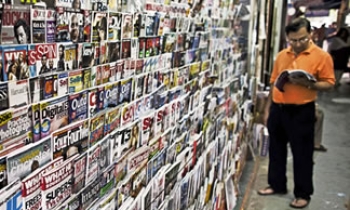KUALA LUMPUR , Mar 2 (IPS) - The Prophet Muhammad cartoon controversy is trailing blood in Malaysian newsrooms at a time when mainstream media showed signs of emerging into the sunshine, after two decades of serving as the mouthpiece of the dictatorial former prime minister Mahathir Mohamad.
At least three newspapers were punished for their reports on the controversy and several television stations, that inadvertently aired fleeting images of the cartoons, now face the chopping block.
In all the newspaper cases, say human rights activists and independent journalists, the offences were minor and did not warrant the stiff penalties that have been meted out.
They allege that pro-Muslim associations, individuals and the opposition Pan Malaysian Islamic Party or PAS that pushed the crackdown have other motives besides defending Islam.
''What many Malaysians find distressful and ominous is that the net result of the furore over the cartoons will be a rollback of freedom of information and expressionàthat has only taken its first few baby-tottering steps,'' said Lim Kit Siang, opposition leader in parliament.
''Bigger and more significant battles are being waged behind the furore over the cartoons,'' he told IPS separately.
Like Lim, others see a tussle between supporters of Prime Minister Abdullah Badawi's reform programmes and powerful interest groups within the system that want the old order perpetuated and are uncomfortable with Malaysia's new, questioning media.
Under the liberal policies of Badawi, Malaysian media quickly developed a bold and stridently questioning tone. For the first time in two decades it gave wide coverage to opposition political parties, civil society groups and others pushing for greater freedom, accountability and transparency.
The sometimes feisty, probing journalism had subjected politicians and political parties to greater scrutiny. The police have been a favourite target with the media which has exposed numerous human rights abuses, corruption and abuse of power.
Also exposed were shoddy construction of several highly visible public projects and questionable multi-billion dollar tenders, unsettling some entrenched ministers and their financial backers.
Powerful politicians were already clamouring for more curbs on the media when the cartoon row erupted in this Malay-Muslim dominated country.
According to them, mainstream media 'crossed the line' when reporting 'sensitive' issues in recent months like the controversy surrounding the burial of a Hindu soldier with Islamic rites and the criticism leveled at Islamic clerics and the government's Islamic Affairs Department.
Also widely reported in the media were the protests by Muslim feminists over a new Islamic family law bill that discriminates against women.
The mainstream 'New Straits Times' escaped with a warning but only after going down on its knees to publish a stand alone apology that covered the entire front page. ''We apologise. Unreservedly,'' screamed the daily's headline on Feb. 24.
The Sarawak Tribune published a montage of the cartoons for a story that derided the cartoons and their creators in Denmark. It apologised profusely, not once but twice but the axe still fell. Police is investigating the editors and they could be charged under any number of laws.
The 'Guang Ming Daily News' carried the photograph of a man reading a newspaper that had one of the controversial cartoons next to the story and had its evening edition suspended for it.
The New Straits Times, a mass circulation mouthpiece for mainstream Muslim opinion published a Wiley Miller 'Non Sequitur' syndicated cartoon that showed a street cartoonist doing a sketch on a drawing board with a sign next to him that states: ''Caricatures of Muhammad while you wait.'' A boxed caption said: ''Kevin finally achieves his goal to be the most feared man in the world.''
Miller was training his well-known wry humour on the controversy surrounding the cartoons of the Prophet Muhammad, originally published in the Danish newspaper 'Jylland-Posten' last September.
The New Straits Times at first defended the cartoon as not insulting to Islam and even reprinted it, inviting readers to express their views. In the editorial, it asked rhetorically whether the complaints against the newspaper were politically motivated. "When the truth gets reported, some get hurt. The powerful ones will seek to protect themselves with whatever means at their disposal," the editorial said without elaborating.
However the invitation enraged some Muslim organisations and powerful individuals, among them Mahathir, his son Mukhriz, a powerful voice in the youth wing of the ruling UMNO party and the newly installed information minister Zainuddin Maidin, a Mahathir loyalist.
Maidin is seen as the flag bearer for the forces demanding tighter media censorship and the rollback of freedom of expression and information. He recently pledged to defend with the Printing Presses and Publications Act and Sedition Act -- two legislations that independent journalists say severely curb media freedom.
''There is a lot of evidence to show that they (certain media) are not being sensitive towards certain issues. This happens because there are journalists from the local media who, having served with the foreign media, embrace the western style freedom and not freedom the Malaysian way,'' Maidin said recently.
To be fair, news reports, late last year, based on secret video grabs of a woman forced to do 'nude squats' in police custody, wrongly identified the victim as a Chinese national, resulting in the Malaysian government having to formally apologise to Beijing.
Early January, the widely-circulated, Chinese-language daily newspaper China Press' which broke the story was obliged to publish its ''deepest apology'' on the front page for the error and also sack its top two editors.
Nevertheless, Lim said that it would be a ''a repudiation of the Prime Minister's reform pledge and programme to lead an open, accountable, transparent and trustworthy administration if the forces for tighter media censorship win the day''.
Malaysia's tiny band of independent media practitioners agree.
''The whole saga (over the cartoons) reeks of a political witch hunt,'' said Steven Gan, editor of the Malaysiakini', independent news website. ''Some of those who are demanding punitive action against the newspaper have an agenda other than defending Islam.''
Gan said there are many who have been unhappy with the New Straits Times's newfound boldness. ''For them it's payback time,'' he wrote in an editorial last week.









